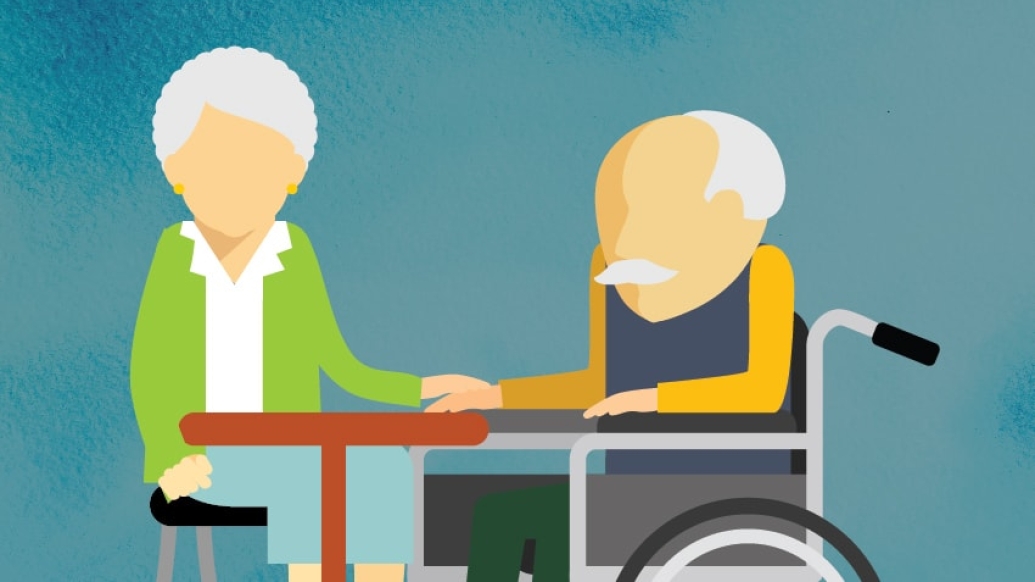After caring for her terminally ill husband, one woman offers guidelines to make the visiting process in a difficult situation easier for everyone.
7:00 AM
Author |

As her husband lay in a memory care facility, his mind and figure succumbing to the detrimental effects of Lewy body dementia, Tamara Real watched another decline unfold.
Some friends and loved ones became fearful or reluctant to visit.
MORE FROM MICHIGAN: Sign up for our weekly newsletter
"I could see how challenging it was for them," says Real, whose spouse, retired University of Michigan professor Carl Rinne, died in 2013. "They didn't understand the situation. They didn't feel comfortable.
"Others just didn't come at all."
Real, who has talked openly about the decision to move her husband into assisted living, also struggled to make the most of her own visits. She often went alone, a sobering challenge when Carl no longer spoke, and wondered what she could do to ensure his comfort.
She knows that feelings of helplessness, not apathy, can fuel the disconnect.
It's why the 62-year-old wrote a list of suggestions for how she'd like to be visited someday — tips others can use.
"I want people to know what I want," Real says.

The idea didn't stem only from Carl's passing.
In 2014, Real was diagnosed with ALS, also known as Lou Gehrig's disease, which has compromised her physical function. The Ann Arbor resident has since included the visitation tips in a binder of documents detailing her end-of-life wishes.
SEE ALSO: 5 Strategies to Help Caregivers Practice Self-Care
Real shared her list so that it encourages others "not to give up" on a person in need, whether that individual can reciprocate, and to put everyone involved more at ease.
"It's something to help the visitor but also help the person who is ill not feel so alone," says Real. "Even when a patient isn't particularly responsive, they know someone's there."
She writes:
Guidelines for visiting me when I can't speak for myself
At some point, I won't be able to articulate my wishes. Here are some thoughts that might help those visiting or caring for me:
Keep visits short: About 20 to 30 minutes is enough. Being with people is tiring for me.
Consider visiting with a buddy: It's hard to converse with someone who can't respond and it can be pretty depressing. You two can talk to each other; I can listen.
Speak clearly and not too quickly: My brain has slowed down and it takes me longer to absorb and process information.
Respect my dignity: Please don't speak about me when I appear to be sleeping — unless you want me to hear what you're saying. I may be simply too tired to open my eyes. Even on one's death bed, it is said that hearing is one of the last senses to go. Either talk to me as if I could respond or leave the room if you want to discuss my condition.
Don't tell me to "be strong": I've been strong all my life. When I'm at the end, I'm at the end.
Don't try to be strong yourself: If you want to cry or get emotional, it's all right. It's an upsetting time. During Carl's illness, I worked to be strong and not let him know how much his decline pained me, and now I worry that he may have thought that I didn't care about him.
Be sure to clean my eyeglasses: It's amazing how smudged they get.
Monitor my comfort: If I'm slumped down in my wheelchair, ask me if I want to be repositioned before you start moving me. Currently, I feel more comfortable in a slumped position than sitting upright.
Play my favorite music: Here is some music I might enjoy listening to:
-
Messiah, Handel
-
Brandenburg Concerti, Bach
-
Sacred Treasures, Russian Orthodox Church Music, multiple volumes
-
Tom Lehrer songs
-
Well-Tempered Clavier, Bach, disc one
-
Carmina Burana, Orff
-
Disc of Carl singing Russian Orthodox music in Russia with conductor Boris Tevlin
For more on Real and Rinne and their advocacy work, visit the Carl Rinne Lewy Body Dementia Initiative online.

Explore a variety of health care news & stories by visiting the Health Lab home page for more articles.

Department of Communication at Michigan Medicine
Want top health & research news weekly? Sign up for Health Lab’s newsletters today!





